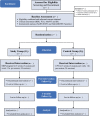The effect of motor relearning on balance, mobility and performance of activities of daily living among post-stroke patients: Study protocol for a randomised controlled trial
- PMID: 35300258
- PMCID: PMC8921790
- DOI: 10.1177/23969873211061027
The effect of motor relearning on balance, mobility and performance of activities of daily living among post-stroke patients: Study protocol for a randomised controlled trial
Abstract
Background: Balance and gait impairments are the most common motor deficits due to stroke, limiting the patients' daily life activities and participation in society. Studies investigating effect of task-specific training using biomechanical balance and gait variables (i.e. kinetic and kinematic parameters) as well as posturography after stroke are scarce.
Objectives: The primary aim of this study is to assess the efficacy and long-term outcome of task-specific training based on motor relearning program (MRP) on balance, mobility and performance of activities of daily living among post-stroke patients.
Methods: In this two-armed randomised controlled clinical trial, a total of 66 sub-acute stroke patients who meet the trial criteria will be recruited. The patients will randomly receive task-specific training based on MRP or a conventional physical therapy program (CPT). Twenty-four physiotherapy sessions will be conducted, divided into three training sessions per week, 1 h per session, for 8 weeks, followed by an analysis of changes in patient's balance, gait and performance of activates of daily living at three time periods; baseline, post-intervention and follow-up after 3-months, using clinical outcome measures and instrumental analysis of balance and gait.
Discussion: The results of this study can guide to better understanding and provide an objective clinical basis for the use of task-specific training in stroke rehabilitation. Also, it intends to help bridge the current knowledge gap in rehabilitation and training recommendations to provide a therapeutic plan in post-stroke rehabilitation.
Trial registration: ClinicalTrials.gov (NCT05076383). Registered on 13 October 2021 (Protocol version: v2.0).
Keywords: Stroke; balance; mobility; motor learning; rehabilitation; task-specific training.
© European Stroke Organisation 2022.
Conflict of interest statement
Declaration of conflicting interests: The author(s) declare that they have no competing interests, and the study has not received external funding.
Figures
References
-
- Verstraeten S, Mark RE, Dieleman J, et al. Motor impairment three months post stroke implies a corresponding cognitive deficit. J Stroke Cerebrovasc Dis 2020; 29: 105119. - PubMed
-
- Gadidi V, Katz-Leurer M, Carmeli E, et al. Long-term outcome poststroke: predictors of activity limitation and participation restriction. Arch Phys Med Rehabil 2011; 92: 1802–1808. - PubMed
-
- Billinger SA, Arena R, Bernhardt J, et al. Physical activity and exercise recommendations for stroke survivors. Stroke 2014; 45: 2532–2553. - PubMed
Associated data
LinkOut - more resources
Full Text Sources
Medical
Miscellaneous


